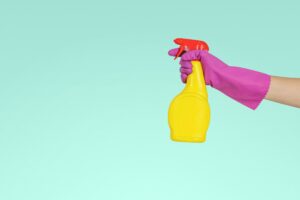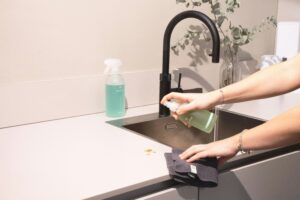In today’s environmentally conscious world, many are turning to homemade cleaners as a sustainable and cost-effective alternative to commercial products. Understanding how to make homemade cleaners empowers individuals to take control of their cleaning routines while minimizing exposure to harsh chemicals. More than just a frugal choice, homemade cleaners offer the peace of mind that comes from knowing exactly what goes into your cleaning products. 
By harnessing common household ingredients like vinegar, baking soda, and essential oils, anyone can concoct effective cleaners tailored to their specific needs and preferences. In this article, we’ll explore the process of making homemade cleaners and delve into the importance of being mindful of the ingredients used in our cleaning products.
Contents
Benefits of Homemade Cleaners
In a world inundated with commercial cleaning products, homemade cleaners offer a host of advantages that make them increasingly appealing to environmentally conscious consumers.
1. Cost-effectiveness:
Homemade cleaners are remarkably budget-friendly, leveraging common household ingredients like vinegar, baking soda, and lemon juice to create effective cleaning solutions. By utilizing items already present in your pantry, you can significantly reduce cleaning expenses over time.
2. Environmental friendliness:
Unlike many commercial cleaners laden with harsh chemicals, homemade cleaners are typically gentler on the environment. By opting for natural ingredients, you not only minimize exposure to potentially harmful substances but also reduce plastic waste associated with purchasing single-use cleaning products.
3. Customizability:
One of the most appealing aspects of homemade cleaners is their adaptability to individual preferences and cleaning needs. Whether you prefer a particular scent or need a specialized solution for stubborn stains, homemade cleaners can be easily tailored to suit your requirements. With endless recipe variations, you can experiment until you find the perfect formulation for your home.
4. Health benefits:
Many commercial cleaners contain chemicals that can be irritating to sensitive individuals or pose health risks with prolonged exposure. Homemade cleaners, on the other hand, often consist of natural ingredients that are safer for both your family and the environment. By eliminating potentially harmful substances from your cleaning routine, you can promote a healthier living environment for everyone in your household.
Essential Ingredients for Homemade Cleaners
When it comes to crafting homemade cleaners, a handful of common household ingredients serve as the backbone for effective and eco-friendly solutions. Here are the essential ingredients you’ll often find in homemade cleaner recipes:
1. Distilled White Vinegar:
A versatile cleaning powerhouse, distilled white vinegar boasts natural antibacterial and deodorizing properties. Its acidic nature makes it effective at dissolving mineral deposits, cutting through grease, and removing stains from various surfaces.
2. Baking Soda:
Baking soda, also known as sodium bicarbonate, is prized for its gentle yet effective abrasive qualities. It acts as a scouring agent, helping to scrub away grime and neutralize odors without scratching surfaces. Additionally, baking soda can be used to regulate pH levels in cleaning solutions.
3. Lemon Juice:
Lemon juice is a natural degreaser and disinfectant, thanks to its high acidity and citric acid content. It’s particularly effective for cutting through grease and dissolving mineral deposits, leaving surfaces sparkling clean and smelling fresh.
4. Essential Oils:
Essential oils not only impart pleasant fragrances to homemade cleaners but also offer additional cleaning and disinfecting properties. Certain oils, such as tea tree oil and lavender oil, possess antimicrobial properties that can help kill germs and bacteria. They also provide a natural alternative to synthetic fragrances found in many commercial cleaners.
5. Water:
While seemingly mundane, water is an essential component of most homemade cleaner recipes. It serves as a solvent, diluting concentrated ingredients like vinegar or essential oils to safe and effective levels. Additionally, water helps to facilitate the cleaning process by loosening dirt and debris from surfaces.
Tips for Using Homemade Cleaners
While homemade cleaners offer many benefits, it’s important to use them safely and effectively to ensure optimal results. Here are some practical tips and precautions to keep in mind when using homemade cleaners:
Test cleaners on a small, inconspicuous area before widespread use:
Before applying a homemade cleaner to a large or visible surface, it’s wise to test it on a small, inconspicuous area first. This allows you to check for any adverse reactions or damage to the surface before proceeding with full-scale cleaning.
Label homemade cleaners properly for safety and identification:
To avoid confusion and ensure safe handling, be sure to label your homemade cleaners clearly with their contents and intended use. This helps prevent accidental ingestion or misuse, especially if you have children or pets in the household.
Store homemade cleaners in appropriate containers away from children and pets:
Store your homemade cleaners in tightly sealed containers away from the reach of children and pets. Choose containers that are durable, leak-proof, and resistant to chemical reactions. Consider using opaque or dark-colored containers to protect light-sensitive ingredients from degradation.
Avoid mixing certain ingredients (e.g., vinegar and bleach) to prevent harmful chemical reactions:
Some household ingredients, such as vinegar and bleach, can produce toxic fumes or other harmful reactions when mixed. Always read ingredient labels carefully and avoid combining incompatible ingredients to prevent accidents or exposure to hazardous substances.
How to make homemade cleaner
In conclusion, mastering homemade cleaner recipes empowers individuals to customize their cleaning solutions while promoting sustainability. By experimenting with common household ingredients, you can create effective cleaners tailored to your needs. Beyond cleanliness, homemade cleaners offer satisfaction in reducing environmental impact and minimizing reliance on harsh chemicals. So, embrace the DIY approach, explore different recipes, and enjoy a cleaner, greener home.





